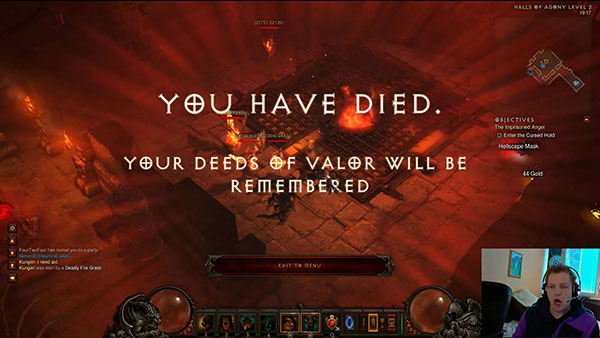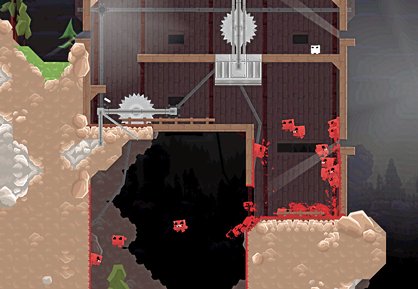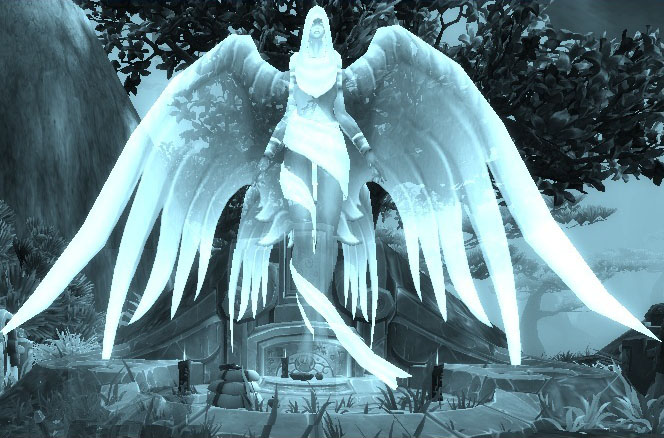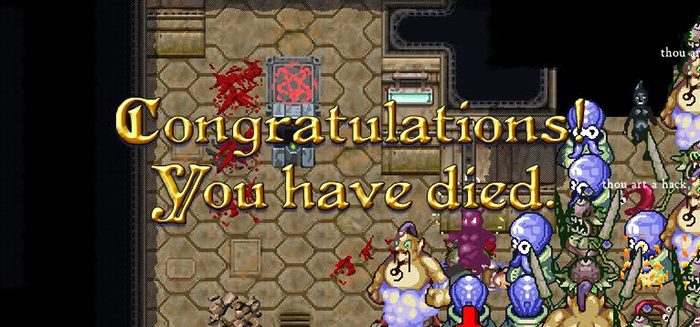Death: From Dungeon Crawl to Meat Boy
2012, October 31st 8:52 AMLet's talk about death.
More generally, let's talk about losing. And more specifically, let's talk about losing in a PvE game, either solo or cooperative.
In the world of the early arcade, the player had to lose in order for the arcade to stay in business. More losses meant more quarters. The player couldn't lose too quickly or they'd get frustrated and bored, but they also couldn't win or they'd lose interest. On the development side of things, the nascent industry couldn't afford complicated endings, complicated plotlines, or often, even multiple levels. The combination was a perfect coincidence, producing what quickly became an arcade staple: difficult never-ending games, usually with little-to-no variety between levels, where the challenge was tied into getting as far as possible and another quarter would let you continue where you left off.
Things were happy. Things were good. Then the arcade died, we started purchasing games for a flat fee, and it all went to hell.
We never quite recovered.

Today, games seem to take one of a handful of approaches towards the "lose" state.
The simplest, and in some ways most intuitive approach, is to approach death as you would actual death. You died. That's it. Game over. Play again? This is generally called "permadeath", a term used to emphasize just how permanent this form of death really is. There's many problems with this approach for general use. First, most players aren't interested in replaying the early stages of a game over and over again to reach the later stages. Second, this means, to prevent extreme frustration, the beginning of the game often has to be more difficult than the end of the game, which is . . . weird, let's say. Third, most modern games are designed with a plot and with a large amount of hand-crafted content. You don't want to spend a ton of money on things the average player will never see, but with the permadeath approach, most players will never see most of the game.
The benefit to this is that you can design a game that is approached as a full-sized challenge. Dungeon Crawl is a roguelike that takes this approach, and single games often take between ten or twenty hours, where a single misstep (occasionally) means death. The game is crafted with this in mind. In the world of the ARPG it's usually called "hardcore mode", and it's been a staple of the Diablo series, and of ARPGs in general, essentially since the genre's beginning. Finally, this is a concept that's spread into the strategy world as well, although its existence is a little more dubious in the world of strategy games since generally by the time you realize you've lost, you've actually been on the losing path for a few hours.

The complete opposite approach is to make death completely irrelevant. Died in the middle of a battle? No problem! Just step back in and keep on shooting! There are very few games that take this approach, and those that do are usually castigated for it. The most recent example is Borderlands 2, which, in co-op mode, allows you to effectively suicide-rush most bosses over and over until you eventually win.
As I said, this approach is uncommon – but a slight modification to this approach is quite common. Instead of allowing the player to resurrect with the world state unchanged, you save the state of the world at specific points – we'll call these "checkpoints" – and if the player loses, they're returned to the checkpoint, with their ammo and health refilled but with all the enemies respawned.
Curiously, this slight modification of a system which is completely opposite permadeath still manages to accomplish many of the same goals as permadeath does – just in a different manner. If permadeath is meant to encourage extremely long difficult but fair games, then instant-retry is meant to encourage long games that have very difficult sections . . . carefully partitioned into tiny, tiny pieces.
Super Meat Boy is the best example of this. The vast majority of the game's levels can be comfortably beat within a minute, given a skilled player, but many of the tougher levels may take *hundreds* of attempts, if the player is capable of beating them at all. People sometimes object to this by saying that the lack of a "game over" screen means that every player is guaranteed to win, but this isn't really true – by ensuring that failure isn't a catastrophic waste of player time, the difficulty of each section can be tuned to be far more difficult, meaning that many players will simply be unable to ever progress past a certain level of difficulty.
While Super Meat Boy explicitly chops the game up into literally hundreds of levels, many other games accomplish the same thing in a more subtle and implicit manner. I actually don't know where this started, but my first experience with the checkpoint system was in Halo. The game attempts to detect when you're out of combat and "safe", then saves a snapshot of the game at that exact moment. If you die, you go back to the snapshot. Halo's auto-checkpointing works, most of the time, but there are alternatives – Ratchet and Clank chose to manually author checkpoints, and Arkham Asylum's game layout resulted in an intuitive and natural checkpoint layout. This is more of an implementation detail than a major game design change, however.
With so many good solutions for dealing with game saving, I find myself wondering why so many games still use bad solutions. Explicit save points were popular with early console games, both for storage reasons and for game design reasons, but there's just no good excuse for them today. Nobody enjoys going out of their way in order to find another save point just in case there's a big nasty monster behind the next door, but that's what explicit save points encourage. Worse, people end up double- and triple-guessing the game designer's savepoint placement, sometimes missing important save points entirely and having to replay large chunks of the game. Shadow Complex is a fascinating example of almost getting this right – "save points" merely have to be entered in order to save, and many of the save points are along major routes that you'll walk across during normal gameplay. But then many of them aren't, forcing the player to guess which door the save point is through, or take tiny detours in order to not risk a loss of progress.
And then there's World of Warcraft.

I don't understand World of Warcraft's death system.
Oh, sure, I understand its behavior. It's not complicated. When you die, you lose a bunch of money and appear at a nearby graveyard. You are given two choices: you can waste *even more* money and have to wait ten minutes to have fun again, or you can spend a bunch of time walking to your corpse in order to resurrect, then spend a further tiny amount of money regaining your health and mana, which, for some unexplained reason, don't just fill up to maximum when you resurrect.
What I don't understand is its purpose.
It's not a significant game penalty – the amount of money lost isn't particularly major, and money isn't hard to acquire in the game (just slow – so really, when I say "money", I mean "time"). In solo content or easy content, nobody has ever said "oh shit, I died, what am I going to do now". The answer's easy: you waddle over to your corpse and un-die. In raid content or difficult content, you really hate dying, but not because of the monetary penalty – you hate dying because dying means you didn't win. Meanwhile, the death penalty adds a whole bunch of wasted time before you can get back to the fun part, namely, trying to win again.
Oh, and when I say "when you die you lose a bunch of money" I don't actually mean "lose a bunch of money", instead your equipment gets damaged and you have to go pay to get it repaired, eventually, and if you forget, then your equipment stops working at all and you suck until you get around to forking over the money. So it's like losing money, except more annoying in every imaginable way.
The whole thing seems like a mechanic specifically designed to ensure that you spend the minimum amount of time having fun and the maximum amount of time being bored, while not actually penalizing failure in any more of a severe fashion than the simple fact that you failed.

Failure, like all game mechanics, should be treated as a tool to improve the game experience. If your game experience requires significant consequences for failure, then by all means, ensure that death comes with consequences. But if your game experience does not require those consequences, don't add a punitive death mechanic just for the sake of making death "sufficiently awful". We don't need extra punishment for failure – ideally, failure itself should be sufficient.


Kniht
2012, November 9th 1:45 AMHow would you compare EVE's death to these games?
Zorba
2012, November 10th 9:39 PMI'd say that Eve is fundamentally a PvP game, which has different rules :)
One of the core concepts behind PvP games is that there's no rewind button. You can't just try the battle again – you *lost*. Sure, you might be able to try a new battle, but the previous battle is now irrevocably set in the stone of history.
In that way, it's kind of like a roguelike. But unlike a roguelike, the player still expects some level of progress. Sure, you lost the battle, but there are many many other battles in front of you, that are – in a somewhat unclear manner – "linked" to your character's abilities.
So, that's what the Eve death penalty provides. You lost, and that consequence is permanent, but simultaneously, your character's progress can never be lost (unless you really thoroughly fuck up, or intentionally gamble that progress with a T3 ship.) It's basically kin to the modern FPS mechanic where your character "levels up" while you fight.
Rob
2012, December 7th 4:51 PMI have 2 things to say about World of Warcraft's death system.
1: The system has evolved over the course of many years. Death in Vanilla felt different than death does now. It's also an evolution of other death systems. For instance, in Everquest, when you died you had to return to your corpse to collect it. I think the premise there was to force you to be careful about how deep you got yourself into something. If anything it was a way to prevent you from advancing too recklessly in a persistent world. If you had no death penalty maybe you could recklessly charge a boss instead of taking it safe. It gave a feeling of fear, or at least reliance on others when you went deep into a dungeon and the halls back started to repopulate. If you didn't keep things together, you were probably going to have to enlist more help getting your stuff back, trust someone to drag your corpse and not steal all of your stuff, risk a bunch of experience trying to drag it back naked, or let it rot.
WoW decided they didn't like having death be that punitive, so instead of having to find a way to avoid the monsters on the path back to your corpse, you were invulnerable until you got to the corpse. If your corpse was somewhere where it wasn't safe to ressurect, you could talk to the spirit healer and recover it automatically. And they didn't want you to ever lose experience when you died. There was also technical issues with the new Instancing system that meant they had to ressurect you as soon as you crossed that portal. However, they still wanted to have some sense of danger when you were in an area that was supposed to be frightening. In WoW, the resources you have to risk are your gold and your time. In games it all comes down to time in the end, barring RMT.
In Vanilla, this had an actual effect. The world was somewhat dangerous, you could get closed in areas if you weren't careful. Monsters could kill you, and you had to plan your attacks a bit in order to not die. Gold was a useful commodity and saving enough for a fast mount was a challenge for many players, and repairs from deaths were something to be avoided. In some cases the better you played the more profitable you were. However, as time went on, the game's focus drastically shifted. Massive inflation hits. Gold becomes relatively worthless, and hugely accessible. While in vanilla you'd get some silver for killing a monster, who, if not separated from his friends properly could kill you. Now you get dozens of gold for finishing a repeatable predictable and unfailable task. The gold penalty becomes meaningless in itself. Likewise, new toys get added to try and entice players to do other less popular tasks, like take up engineering for repair bots, so even then in many cases the time penalty is all but eliminated as well. Past that, any challenge now comes from instanced content, world encounters have turned into something impossible to lose, and so the corpse running makes even less sense, especially with graveyards some yards away from instance entrances.
2: All death penalties in all games are some kind of waste of time. Unless you need to put something besides time into a game, the only punishment the game can dole out apart from deleting itself or making fun of you to your friends over twitter (don't make a game that does this please) is to waste your time. WoW's goal ultimately is to encourage players to progress their character. Makes sense; if you can create a character and immediately start killing everything, you don't play as long as if you have to level up, and gear up, and keep gearing up. The only way they can do this is to make you die if you try to kill something that's too hard for you (or strictly restrict you based on how whether you have gained enough power, which is something else they've recently added).
This has sort of become the new "why" of WoW's death system, mostly just to stop you from doing stuff they want you to spend more time on than you have before you can succeed. The fact that the punishments are mostly just busywork is mostly vestigial from the days when the game was very different, when there was resource management, and making a profit wasn't a given. And even then, it is something that evolved from what was deemed acceptable for the genre. A lighter touch on the punitive take forerunners had come. Any new MMO Blizzard made would probably have a very different death system, but the raison d'etre has significantly shifted since the original game, but too much change too fast in a game like WoW would be disruptive. So instead, they let it become irrelevant, kind of annoying busywork.
Anonymous
2018, July 5th 3:08 AMWhy do you congratulate a dead person?
Anonymous
2018, July 5th 3:52 AMYou should play Omikron: The Nomad Soul
Anonymous
2018, July 5th 5:01 AMWhat game is that final "Congratulations! You have died" screenshot from?
Anonymous
2018, July 5th 5:03 AMIt's from Dungeons of Dredmor. (I'm the same anonymous poster, I just realised after posting that I actually recognised it myself).
Anonymous
2018, July 5th 6:47 AMDetails on WoW's death system:
– as a player, it 'works' for me: If I try to recklessly brute-force a fight for which I don't bring the proper resources.. After e.g. 2 failed attempts, the death-mechanism has humbled me sufficiently that, even I would manage to bruteforce it on a 3rd attempt, I won't feel like I 'won' (because it makes me feel that my judgement failed.)
Secondly: It is adaptive: Your first death is a relatively light penalty.
If you repeatedly die in a short timespan, it gradually ramps up the punishment,
in how long it forces you to wait before being able to resurrect.
Again, this – for me – enforces the feeling that my choices reflected poor judgement.
I am also an old roguelike player, so I have a basis for comparison with perma-death.
Anonymous
2018, July 6th 8:28 AM"First, most players aren't interested in replaying the early stages . . . Second . . . the beginning of the game often has to be more difficult than the end of the game . . . Third, most modern games are designed with a plot and with a large amount of hand-crafted content. You don't want to spend a ton of money on things the average player will never see . . ."
I disagree with this.
1. Players should want to replay early stages if they're fun. This only requires gameplay deep enough to sustain replays.
2. Making early areas harder than later areas won't curb frustration, unless the later areas also become easier.
3. Handcrafted content can feel even more special when it takes effort to reach. (See: Radiant Silvergun)